
views
Dietary Changes

Follow a balanced diet to regulate your hormone production. In general, a balanced diet high in fruits, vegetables, whole grains, and lean proteins is best for regulating your body’s hormones and increasing fertility. Design a healthy diet to support your body’s hormone production. Also try to reduce your intake of fatty, processed, or fried foods. These could inhibit your body’s hormone production and your fertility.
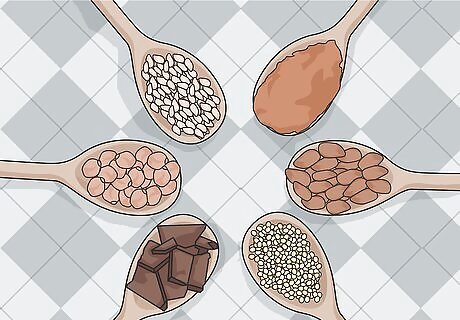
Eat foods high in magnesium. Your adrenal glands produce progesterone, and magnesium helps keep them healthy. Include 310-420 mg of magnesium in your diet each day to support your adrenals. Magnesium is in many different foods. Good sources include leafy green vegetables, nuts, legumes, seeds, and whole grain bread.

Increase your intake of folic acid. Studies show that vitamin B9 (folic acid) could boost your progesterone levels and support fertility. The recommended serving for folic acid is 200 mcg each day, so make sure you get this from your diet or supplements. Good sources for all B vitamins are leafy green vegetables, organ meats, beef, lentils, dairy, beans, and fortified foods.

Drink plenty of water each day to stay hydrated. Fluids are important for regulating your body’s hormone production and flushing out toxins. There's no single answer on how much water you need each day, but 8 glasses is a good goal. This is usually enough to prevent dehydration and support your body’s hormone production. You might need more water if you exercise or it’s hot outside. If you feel thirsty or your urine is dark yellow, then drink more water.
Lifestyle Steps

Exercise daily to regulate your body’s hormone production. Moderate exercise is important for supporting your overall health, including your body’s hormone production. Try to get 30 minutes of exercise each day to maintain your progesterone levels. The official definition for moderate exercise is activity that increases your heart rate by 50%. If your normal resting heart rate is 70 beats per minute, then moderate exercise should bring it to 105. If you want to boost your fertility, then moderate exercise is also an important part of that. Excessive exercise could actually lower your progesterone levels, so make sure you only get a moderate amount of exercise for the best results.
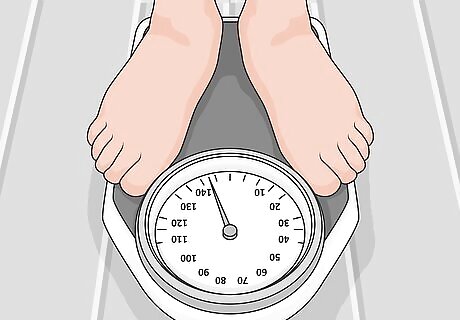
Maintain a healthy bodyweight. Being overweight could reduce your fertility and interfere with your body’s progesterone levels. If you’re overweight, then speak with your doctor to find out the ideal weight to support your fertility. Then design a diet and exercise program to reach and maintain that weight. Avoid extreme or crash diets. These aren’t healthy and could interfere with your body’s hormone production. Being overweight could also interfere with a man’s fertility, so your male partner may need to lose weight as well if you're trying to get pregnant.

Reduce stress to keep your hormones balanced. Besides having many other negative health impacts, stress interferes with your adrenal glands and could prevent them from producing enough progesterone. Do your best to keep your stress levels down so your adrenal glands work properly. Relaxation techniques like meditation or deep breathing are great ways to reduce stress. Try spending 10-20 minutes doing one of these activities each day. Doing things you enjoy also reduces stress. Try to make time for your hobbies or anything else you enjoy every day.

Sleep 7-8 hours each night. Regular sleep is an important way to control your stress levels. Do your best to sleep for 7-8 hours each night so you wake up well-rested. This is also important for maintaining your fertility levels. If you have trouble sleeping, try to wind down for an hour before bed. Listen to soft music, read, or take a bath to relax yourself. Low progesterone levels could cause insomnia, so taking other steps to boost your progesterone could help you sleep better as well.
Herbs and Supplements

Reduce stress and anxiety with calming herbs. Since stress can interfere with progesterone production, so it’s important to keep your stress and anxiety under control. Some herbs could help. Particularly, chamomile, valerian, lemongrass, and passionflower are associated with decreased stress and anxiety. You can take one of these in supplement form, but ask your doctor first to make sure it's safe. You could also take these herbs as teas. Try having 3-5 cups per day to see if they help reduce your stress.

Take multivitamin supplements if you have nutrient deficiencies. Most people get enough vitamin B, zinc, and magnesium from their regular diet. However, if you have any deficiencies, it could affect your progesterone levels and cause infertility. Visit your doctor for a blood test and if you’re deficient in any nutrients, then you can start taking a vitamin supplement to replace them. The type of supplement you take depends on which nutrients you're short in. Ask your doctor for a recommendation.
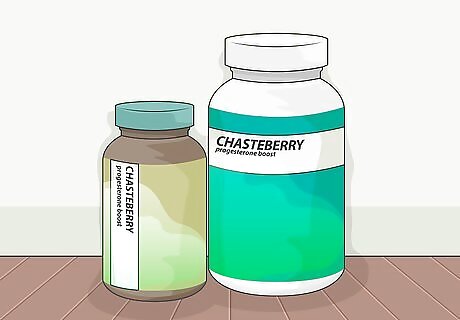
Try chasteberry to boost progesterone production. There’s some evidence that this herb could boost progesterone production. It’s generally safe to try, so you can see if this works for you. A standard dose is 4 mg per day, but follow the instructions on the type that you use. Chasteberry comes as a capsule or liquid. The dosing depends on how concentrated the mixture is, so take it according to the product directions. If you’re already on any kind of hormone therapy, then don’t use chasteberry.
Progesterone-Boosting Products
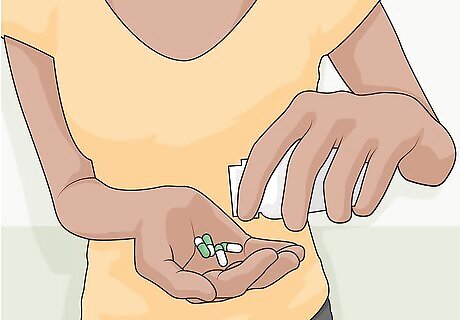
Take oral progesterone supplements. These supplements are part of hormone replacement therapy and could bring your progesterone levels back up. They come in pills or oil form, so you can use the type that you find easier to swallow. They usually require a prescription, so ask your doctor for approval and follow all their directions to take these supplements correctly. Instructions vary depending on the supplement type, but usually you only need one dose per day. Common dosages range from 50 to 400 mg daily. You may also need to take the progesterone on alternating days. Check with your doctor if you have any questions.
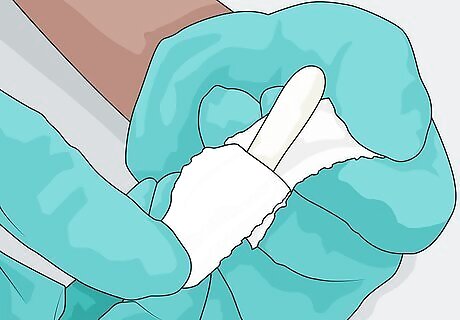
Try progesterone suppositories to strengthen your uterus. These suppositories, used vaginally, will deliver hormones to your uterus and could prevent miscarriages. Ask your doctor if this option is right for you. If they agree, then follow the doctor's directions for using the suppository correctly. A common dosage is 400 mg once a day, but follow your doctor's instructions. You'll probably need a prescription for this product, so speak to your doctor or pharmacist to get it. Suppositories are not designed to take by mouth.
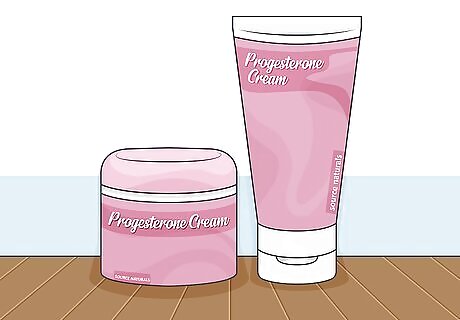
Apply progesterone cream to slow the aging process. Some creams use progesterone as a skin treatment. Research shows that these creams can reduce wrinkles and signs of aging, so they may help improve your skin's appearance. You can apply the cream anywhere you have wrinkles, which is usually your face, and see if it makes your skin more elastic. Progesterone cream isn't effective for increasing the progesterone in your bloodstream. You probably don't need a prescription for these creams, but ask your doctor before using them.

















Comments
0 comment